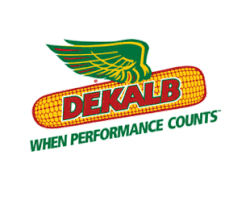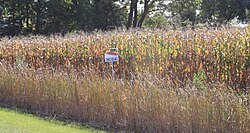| Revision as of 00:35, 18 September 2015 editAnomieBOT (talk | contribs)Bots6,578,299 editsm Dating maintenance tags: {{Deadlink}}← Previous edit | Latest revision as of 04:01, 11 July 2024 edit undo2600:1008:b0cc:e6f0:d52c:78bb:23ac:c19f (talk) ConsistencyTags: Visual edit Mobile edit Mobile web edit | ||
| (23 intermediate revisions by 20 users not shown) | |||
| Line 1: | Line 1: | ||
| {{short description|Agriculture company purchased by Monsanto in 1998}} | |||
| {{Infobox company| | {{Infobox company| | ||
| name = DEKALB Genetics Corporation | | name = DEKALB Genetics Corporation | | ||
| Line 5: | Line 6: | ||
| foundation = ], ] (1912) | | foundation = ], ] (1912) | | ||
| products = ], ] | | products = ], ] | | ||
| parent = ] | parent = ] | ||
| }} | }} | ||
| ] | ] | ||
| '''DeKalb Genetics Corporation''' (often stylized '''DEKALB'''; formerly '''DeKalb Agricultural Association''' and '''DEKALB AgResearch''') was a diversified company headquartered in ] that marketed agricultural ]s and other products. The company was best known for its leading role in the development of hybrid corn and for its "winged ear" logo. DeKalb Genetics Corporation was purchased by the ] in 1998. The DeKalb seed business, the DEKALB brand and the winged ear logo are now owned and managed by |
'''DeKalb Genetics Corporation''' (often stylized '''DEKALB'''; formerly '''DeKalb Agricultural Association''' and '''DEKALB AgResearch''') was a diversified company headquartered in ] that marketed agricultural ]s and other products. The company was best known for its leading role in the development of hybrid corn and for its "winged ear" logo. DeKalb Genetics Corporation was purchased by the ] in 1998 and has been owned since 2017 by Bayer. The DeKalb seed business, the DEKALB brand and the winged ear logo are now owned and managed by ].<ref></ref> | ||
| ==Corporate history== | ==Corporate history== | ||
| The history of DeKalb Genetics Corporation can be traced back to the ] county organization, founded in DeKalb |
The history of DeKalb Genetics Corporation can be traced back to the ] county organization, founded in DeKalb, Illinois in 1912.<ref name=Troyer>Troyer, A. Forrest. ''Development of Hybrid Corn and the Seed Corn Industry.'' '''''In:''''' Handbook of Maize Genetics and Genomics. Bennetzen, Jeff L.; Hake, Sarah (Eds.) Springer, 2009, pages 87–114.</ref> Tom Roberts, Sr. became the assistant manager in 1919 and then manager from 1920 to 1932. In 1923 ],<ref>Henry C. Wallace was the father of ], who later founded DeKalb's later chief competitor, ].</ref> the ], spoke at the DeKalb Farm Bureau picnic and recommended development of ] ]. Roberts took up the project, even though he understood there would be a 12-year lead time before he could bring a product to market. As a result of this effort DeKalb AgResearch sold hybrid corn seed beginning in 1935. Sales expanded rapidly as Roberts organized a force of farmer-dealers, who were paid a 15% commission. The first popular hybrid was DeKalb 404A, which sold 508,000 bags in 1947, the same year total DeKalb sales exceeded 2,000,000 bags of seed corn. The first popular full- and short-season, large volume, single-cross maize hybrids were DeKalb hybrids 805 and XL 45. As a result, DeKalb was the leader in U.S. hybrid seed corn sales from the mid-1930s until the mid-1970s (Crabb 1948. Roberts 1999).<ref name=Troyer/> | ||
| In 1982 DeKalb formed a joint venture with ], called DeKalb-Pfizer Genetics, and in 1985 the name was changed to DeKalb Corporation. The seed business was spun off as DeKalb Genetics Corporation in 1988.<ref>http://www.dekalbalumni.org/history/Invironments_DAA_Article.pdf DEKALB Alumni Association. ''The History of DEKALB.'' April 29, 2009.</ref> | In 1982 DeKalb formed a joint venture with ], called DeKalb-Pfizer Genetics, and in 1985 the name was changed to DeKalb Corporation. The seed business was spun off as DeKalb Genetics Corporation in 1988.<ref>http://www.dekalbalumni.org/history/Invironments_DAA_Article.pdf DEKALB Alumni Association. ''The History of DEKALB.'' April 29, 2009.</ref> | ||
| Monsanto first entered the |
Monsanto first entered the corn seed business when it purchased 40% of DeKalb in 1996. It purchased the remainder of the corporation in 1998.<ref name=Troyer/><ref> {{webarchive |url=https://web.archive.org/web/20120714022240/http://www.justice.gov/atr/public/press_releases/1998/2103.htm |date=July 14, 2012 }}</ref> The last president of the company before the acquisition was Richard O. Ryan. | ||
| ==References== | ==References== | ||
| Line 24: | Line 25: | ||
| {{Commons category-inline|DeKalb Genetics}} | {{Commons category-inline|DeKalb Genetics}} | ||
| {{US seed companies}} | |||
| {{Monsanto}} | {{Monsanto}} | ||
| Line 32: | Line 34: | ||
| ] | ] | ||
| ] | ] | ||
| ] | |||
| ] | |||
Latest revision as of 04:01, 11 July 2024
Agriculture company purchased by Monsanto in 1998 | |
| Company type | Subsidiary |
|---|---|
| Founded | DeKalb, Illinois, USA (1912) |
| Products | crop seeds, chickens |
| Parent | Bayer |

DeKalb Genetics Corporation (often stylized DEKALB; formerly DeKalb Agricultural Association and DEKALB AgResearch) was a diversified company headquartered in DeKalb, Illinois that marketed agricultural seeds and other products. The company was best known for its leading role in the development of hybrid corn and for its "winged ear" logo. DeKalb Genetics Corporation was purchased by the Monsanto Company in 1998 and has been owned since 2017 by Bayer. The DeKalb seed business, the DEKALB brand and the winged ear logo are now owned and managed by Bayer.
Corporate history
The history of DeKalb Genetics Corporation can be traced back to the Farm Bureau county organization, founded in DeKalb, Illinois in 1912. Tom Roberts, Sr. became the assistant manager in 1919 and then manager from 1920 to 1932. In 1923 Henry C. Wallace, the Secretary of Agriculture, spoke at the DeKalb Farm Bureau picnic and recommended development of hybrid corn. Roberts took up the project, even though he understood there would be a 12-year lead time before he could bring a product to market. As a result of this effort DeKalb AgResearch sold hybrid corn seed beginning in 1935. Sales expanded rapidly as Roberts organized a force of farmer-dealers, who were paid a 15% commission. The first popular hybrid was DeKalb 404A, which sold 508,000 bags in 1947, the same year total DeKalb sales exceeded 2,000,000 bags of seed corn. The first popular full- and short-season, large volume, single-cross maize hybrids were DeKalb hybrids 805 and XL 45. As a result, DeKalb was the leader in U.S. hybrid seed corn sales from the mid-1930s until the mid-1970s (Crabb 1948. Roberts 1999).
In 1982 DeKalb formed a joint venture with Pfizer, called DeKalb-Pfizer Genetics, and in 1985 the name was changed to DeKalb Corporation. The seed business was spun off as DeKalb Genetics Corporation in 1988.
Monsanto first entered the corn seed business when it purchased 40% of DeKalb in 1996. It purchased the remainder of the corporation in 1998. The last president of the company before the acquisition was Richard O. Ryan.
References
- DEKALB Alumni Association website, 2009.
- ^ Troyer, A. Forrest. Development of Hybrid Corn and the Seed Corn Industry. In: Handbook of Maize Genetics and Genomics. Bennetzen, Jeff L.; Hake, Sarah (Eds.) Springer, 2009, pages 87–114.
- Henry C. Wallace was the father of Henry A. Wallace, who later founded DeKalb's later chief competitor, Pioneer Hi-Bred.
- http://www.dekalbalumni.org/history/Invironments_DAA_Article.pdf DEKALB Alumni Association. The History of DEKALB. April 29, 2009.
- Justice Dept Press Release Archived July 14, 2012, at the Wayback Machine
External links
![]() Media related to DeKalb Genetics at Wikimedia Commons
Media related to DeKalb Genetics at Wikimedia Commons
| Monsanto | |||||
|---|---|---|---|---|---|
| People |
| ||||
| Subsidiaries | |||||
| Facilities |
| ||||
| Products | |||||
| Amusement park attractions | |||||
| Legal cases and protests | |||||
| Related | |||||